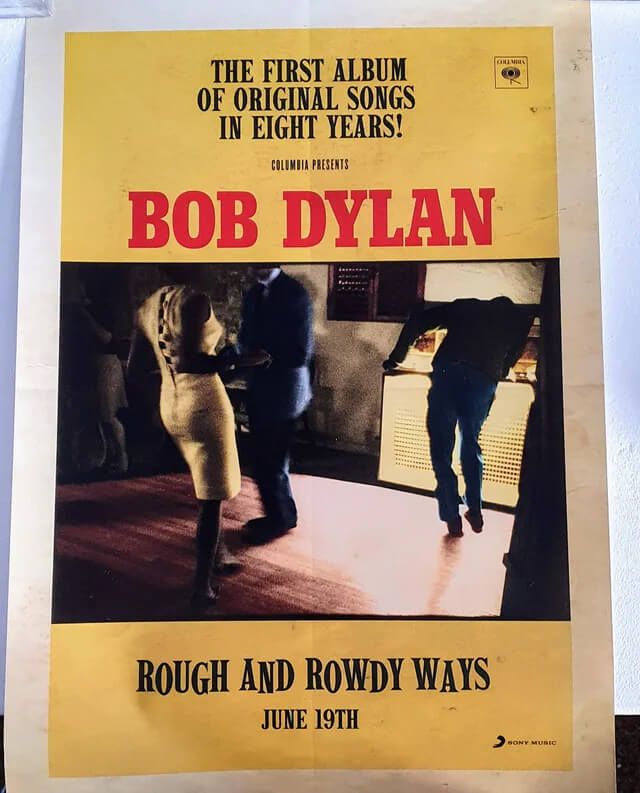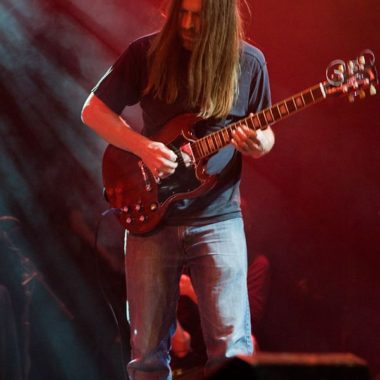Today, tomorrow, and yesterday, too
The flowers are dyin’ like all things do
Follow me close, I’m going to Bally-Na-Lee
I’ll lose my mind if you don’t come with me
I fuss with my hair, and I fight blood feuds
I contain multitudes
So go the first lines of Bob Dylan’s first album of new songs in eight years. He carries on, in the opening track, to liken himself to Edgar Allen Poe, Ann Frank, Indiana Jones, the Rolling Stones and William Blake, not to mention copping the title from Walt Whitman. He sings—in a wizened rasp that surely by now has outlived the naysayers who say he can’t sing—that he’ll play Beethoven sonatas and Chopin preludes because, why? Because he contains multitudes.
It’s a hilarious song, the kind of brash humor earned with age. Dylan here is like the old Commander McBragg cartoons: he’s seen it all, you don’t know enough to correct him, and if you do, how dare you! But it’s more than that. It’s a deep song, rich in subtext. He promises his love half his soul—not all of it, half—and says he’ll drink to the man who shares her bed. He issues a threat to someone else (the man in her bed?) to sell them down the river, put a price on their head, and show them his heart—“but not all of it, only the hateful part.” He tells us he carries two pistols and four large knives. He’s a vengeful cuckold, a man of contradictions and of many moods. He contains multitudes. It’s a hard song to get a handle on, but you know just where he’s coming from. He’s been around the block. You can’t set your alarm clock early enough to fool him, because he’s Bob Dylan, he ain’t nobody’s fool. It’s hard even to end one paragraph and begin the next when talking about him. Bob Dylan contains multitudes.
With Rough and Rowdy Ways, Bob Dylan has become the first artist to make the Billboard Top 200 album charts in every decade since the 1960s. The epic, 17-minute “Murder Most Foul” gave him his first Billboard #1 single. Praise has been heaped in much-deserved lots since the album’s June 19 release—his best in years, his best in decades, one of his best ever, one of his most timely. Certainly, it feels good to praise Bob Dylan’s new work as he approaches 80, and it feels good to praise anything in times of disease and corruption. And Rough and Rowdy Ways absolutely ranks among his best, combining the emotional intensity of Blonde on Blonde with the smooth full-band groove of Street Legal and doing so without looking back.
But it’s not just a great record, it’s a record that can’t stop proclaiming its own greatness. It’s an album about greatness that could only be sung from the vantage of top of the heap. Dylan sings to us from on high. He’s not a rapper claiming to be the best while the next 50 rappers queued up in autoplay await their turns to claim to be number one. This is someone who has narrated more than half a century for the masses. That word is important. Dylan is our narrator. He has always and adamantly refused the role of spokesman, of leader, even of activist. He watches from the moon, describing the turmoil or the 1960s and the spiritual quests of the 1970s, defining the search for love and the yearning for solitude. He observes us and defines us, from above and yet as one of us. He’s a narrator for our times.
References and namechecks to great men abound across Rough and Rowdy Ways, and it’s hard not to draw the conclusion that Dylan is claiming his place among them all, among Robert Johnson, John Lee Hooker, Bob Wills, Jimmy Reed (especially Jimmy Reed), Jelly Roll Morton, Charlie Parker, Bud Powell, Oscar Peterson, Stan Getz, Art Pepper, Thelonious Monk, Nat King Cole, Elvin Presley, Louis Jordan, Frank Sinatra, Buddy Holly, the Everly Brothers, Gerry and the Pacemakers, Ricky Nelson, Carl Wilson, the Who, Burt Bacharach, the Eagles, Lindsey Buckingham, the Allman Brothers, Queen, Billy Joel, Warren Zevon, and Liberace; among William Shakespeare, Dante Alighieri, Allen Ginsberg, Gregory Corso and Jack Kerouac; among Buster Keaton, Harold Lloyd, Al Pacino and Marlon Brando; among St. John the Apostle and Martin Luther King, Jr., Sigmund Freud and Karl Marx, Harry Houdini and Wolfman Jack, not to mention presidents Franklin D. Roosevelt, William McKinley, Harry S. Truman and, of course, John F. Kennedy. (While Dylan also namechecks Patsy Cline, Ann Frank, Etta James, Jacqueline Onassis Kennedy, Marilyn Monroe and Stevie Nicks, his referencing is enormously masculine. Whether that’s understandable, unforgiveable or just unwoke, I’ll leave to others to unpack.) He’s as good as any of ’em, better than all of ’em, but who is he? It took six actors just to depict in Todd Haynes’ brilliantly fanciful biopic I’m Not There (the title suggesting that none of the six quite fill his shoes). If he’s our narrator, should we know who he is?
In “Crossing the Rubicon,” Dylan puts himself in the shoes (or sandals) of Julius Caesar, defiantly leading his troops across the Rubicon River, giving rise to the Roman Civil War and eventually his dictatorship. But the subject soon turns to love, that river now redder than a woman’s lips. Blood flows from a rose, the protagonist prays to the cross (jettisoning us at least 75 years after Caesar’s death). He kisses all the girls, then nullifies it all. He cannot redeem time spent idly, he proclaims, lapsing into machismo posturing (violent threats lace his boastful lyrics): “I can feel the bones beneath my skin / And they’re tremblin’ with rage / I’ll make your wife a widow / You’ll never see old age.” By the time the ninth and final verse passes (it’s also an album of many verses and few choruses), our hero feels the presence of the holy spirit while looking for his lost love, having lived, it seems, for centuries.
Elsewhere, Dylan calls to his muse, who sings of mountains and military men, while professing his love for another, Calliope, the muse of epic poetry. It’s a complicated scene, counteracted by “I’ve Made Up My Mind to Give Myself to You,” in which Dylan offers one of the simplest and loveliest love songs he’s recorded.
The first disc of Rough and Rowdy Ways clocks in at under an hour. There was easily enough room on the CD release to include the 17-minute “Murder Most Foul.” But that song is housed on its own disc, with its own cover image of JFK on the flip. Like an old two-for-one dimestore novel, the album has two front covers and no back. We’re meant to consider the last song separately—not as a different work but as a final act, after intermission. On “Murder Most Foul,” Dylan returns to the era which, however much he hopes to disassociate, he will forever be connected, and to one of the defining moments of that decade.
It is, in true fashion, an inexplicably brilliant and impenetrably evocative song. It’s clear that, to Dylan, Kennedy’s assassination represents the death of certain dreams. Other events of the decade pale in the lyrics against this one event: the Beatles came to America, but Kennedy was shot; we had three days of peace and music at Woodstock, but Kennedy was shot. Nobody knows how, nobody knows why. The lyric hints at who was responsible (dismissing the lone gunman theory), but we still don’t know. Bob Dylan can’t solve the mystery and he can’t bring Kennedy back to life. All he can do is describe, again, the events of his generation.
In his acceptance speech for the 2016 Nobel Prize in Literature, read at the ceremony by United States Ambassador to Sweden Azita Raji, Dylan humbly wrote that “if someone had ever told me that I had the slightest chance of winning the Nobel Prize, I would have to think that I’d have about the same odds as standing on the moon.” But one has to wonder if he really thinks about standing on the moon. One has to wonder to what, as he nears his 80th year, he aspires. Does he still hope to achieve, or is the hope for one more timeless song enough?
Bob Dylan’s new album is important, not because he’s updated the lyrics to “The Times They Are a-Changin’” for 2020. He hasn’t. It’s not important because it’s one of the best records he’s made, even though it is. It’s important because Bob Dylan’s important. That he knows it does nothing to change the fact.












13 Comments
There’s a lot to like about this review, though it does repeatedly get the title of the album wrong.
Yep, great review, apart from getting the title wrong (bit like those who thought ‘Tempest’ was ‘The Tempest’. I’ve started going through the Signature Classics Shakespeare volumes of plays I don’t know and it’s uncanny how much Dylan reminds me of Old Bill (both thieves).
Ian, Adelaide, Australia
Nice review but no mention of key west probably the most atmospheric song or poem I’ve ever heard.
Dylan may one day play live on his net from some lunar location because he contains multitudes.
Well thought out, Bob just continues to amaze us. He is our Shakespeare, our Melville, our Steinbeck. It’s a better world with Bob in it.
The Shakespeare of our time ,only better. We are lucky to be alive during his life.
I’ve been a Dylan fan 53 years. Clinton picked the wrong poet. Dylan IS the poet laureate of America. Like he said: I’m a poet and I know it hope I don’t blow it.
I’ve been listening to Bob Dylan’s work for almost 50yrs! In my eyes Bob is all that! And I listen (and sing along irresistibly) to his unbelievable creativity. Around here in my home you are in the “Bob Dylan Zone”! My life has been influenced by many artists including Seger, Allman Brothers, Skynyrd, Molly Hatchet, Marshal Tucker band, Clapton, Presley, etc,etc,etc…..Folk, rock, blues, country, R & B etc, etc…. and proud to say Bobby D is still on top! What a career, what a pleasure to my ears and my soul……
Thanks for the comments, and the notes about the title! I had the Jimmie Rogers song (from whence the title comes) too much in my head!
I love this album and to be honest I love most everything he has done. He has always meant alot to me.
Rough and Rowdy Ways should remind everyone how fortunate we are to have Bob Dylan still around. Agree with the reviewer. One of his best!
Dylan needs to retire.
Great insights. Wondering at Bob’s imitation of Jimi in the picture.
He ain’t no false prophet, that’s for sure.